Choosing the right business bank account is crucial for UK business owners, startups and self-employed people. At BusinessBanks.co.uk we simplify the process by providing a comprehensive comparison of the best business bank accounts. Discover the features, fees, and benefits to find the perfect account for your business needs.
Compare Top 58 UK Business Bank Accounts In 2025
3S Money business account

- Online business account designed for global market access.
- Supports operations in over 190 countries.
- Handles transactions in 65+ currencies.
- Offers high-value international payments.
- Provides 5x cheaper foreign exchange fees.
- Integrates with major online marketplaces.
- Two account types: Standard International and Bespoke International.
- Monthly maintenance fee of $100.
- Requires a minimum balance of $300.
- Not a traditional bank; classified as an Electronic Money Institution.
- Regulated by the UK Financial Conduct Authority.
- Ensures 100% liquidity of client funds.
- Ideal for importers, exporters, and e-commerce businesses.
Acorn Account

- Business account for small businesses with a turnover under £2 million.
- No credit check required for opening.
- Can be opened online in 24 hours.
- Offers 24/7 online banking.
- Comes with a prepaid Mastercard.
- Provides SMS and telephone banking.
- Deposits cheques and cash at Barclays branches.
- Account application fee of £65.
- Monthly fee starts from £12.50.
- Additional fees for transactions.
- Not covered by Financial Services Compensation Scheme (FSCS).
- Authorised Payment Institution, not a bank.
Airwallex business account

- Business accounts designed for global operations.
- Multi-currency accounts.
- High-speed international transfers.
- Offers borderless cards and expense management tools.
- Online payments integration.
- Links with Xero, Amazon, and Shopify.
- Provides automated solutions for bill payments.
- Eliminates the need for traditional bank queues and paperwork.
- Focus on automating foreign exchange and expense management.
Aldermore business savings account

- Offers fixed rate and easy access business savings accounts.
- 1-year fixed rate account at 4.50% AER.
- 6-month fixed rate account at 4.05% AER.
- Easy access business savings account at 3.25% AER.
- Minimum opening balance of £1,000.
- FSCS protection up to £85,000.
- Suitable for UK-based businesses.
Allica Bank business account

- Business Rewards Account for SMEs.
- No monthly fees.
- Free bank payments.
- Offers up to 1.5% cashback on eligible purchases.
- Instant access savings pot at 3.5% AER.
- FSCS protection up to £85,000.
- No support for international payments or cash deposits.
- Ideal for businesses with a turnover greater than £700,000.
Allied Irish Bank (GB) business account
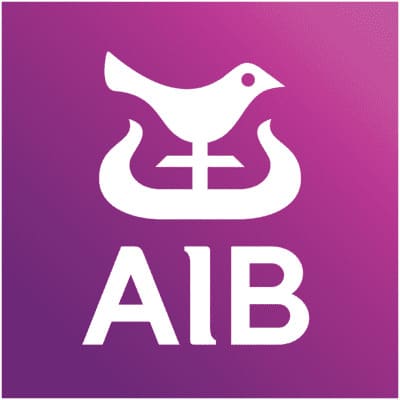
- Business current account with a £10 quarterly fee.
- Internet banking and electronic payments.
- Offers a business debit card and overdraft facility.
- Supports international payments in various currencies.
- Charges 55p for debit card transactions and direct debits.
- Proof of identity and address required for account opening.
Amaiz business account

- Online and mobile banking for sole traders and small businesses.
- Built-in invoicing and accounting services.
- Specialist customer support and instant payment notifications.
- Discounted card payment machines.
- Offers two account options for sole traders and limited companies.
- Monthly fees range from £4.99 to £99 (plus VAT).
- Charges apply for ATM withdrawals and international transfers.
ANNA Money business account

- Business accounts for sole traders and small businesses.
- Automates tax returns and invoicing.
- 24/7 customer service.
- Integrates with Xero accounting software.
- No cheque deposits.
- Not covered by the FSCS.
- Pay-as-you-go option with no monthly fee.
- Eligibility includes UK-based sole traders or directors of limited companies.
Atom Bank business savings account
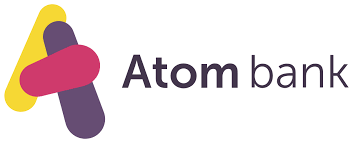
- Specialises in savings accounts and secured loans (no business current account).
- Instant Saver account with a 2.95% EAR, no minimum deposit required.
- Fixed Saver accounts with terms from six months to five years, offering higher interest rates.
- Secured loans with fixed or variable interest rates.
- Suitable for businesses and sole traders.
- More stringent with loan applications for businesses with financial difficulties.
Bank of Scotland business account

- Offers a variety of business current accounts for startups, larger businesses, and community groups.
- Start-up account with no monthly fee for the first 12 months.
- Business Extra account with a £15 monthly fee; Electronic Business account with a £20 monthly fee.
- Community account offers free banking for eligible applicants.
- FSCS protection up to £85,000.
- Eligibility includes UK businesses.
Barclays business bank account

- Startup Business Account with 12 months of free banking for new businesses.
- Mixed Payments Plan and e-Payments Plan available after the free period.
- Monthly charges around £6-£6.50, depending on the plan.
- Interest rates on business savings accounts vary, currently at 0.01% AER for the Business Premium Account.
- Eligibility requires UK residency and a business operating in the UK.
Bunq business account
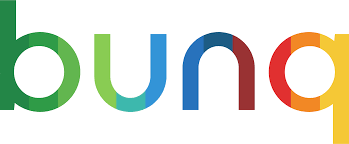
- Offers three business account tiers: Easy Bank Business (€2.99/month), Easy Money Business (€9.99/month), and Easy Green Business (€19.99/month).
- Multi-currency support and real-time notifications.
- Integrated accounting features.
- Competitive transaction fees for international payments.
- Suitable for freelancers and SMEs.
- Minimal eligibility requirements beyond identity verification and business registration.
Cambridge Building Society business account

- Offers business savings accounts.
- Business Instant Access account with 0.15% AER for balances above £1,000.
- 30-Day Business Notice account with 0.20% AER for balances over £10,000.
- No monthly fees but charges apply for certain transactions like CHAPS (£25 per transaction).
- UK-registered businesses are eligible.
CardOneMoney business account

- Business current account aimed at small businesses and startups.
- No credit check required for opening.
- Features online banking, a business Mastercard, and multi-user management.
- No overdraft or loan facilities.
- Monthly fee of £12.50, plus a one-time £55 application fee.
- Transaction fees include £0.30 for electronic payments and £0.85 for ATM withdrawals.
Cater Allen Private Bank business account

- Reserve Business Account with a minimum balance requirement of £5,000 to avoid a £25 monthly fee.
- Interest paid on balances over £10,000.
- Transaction fees include 30p for cheques, standing orders, and electronic payments.
- Interest rate starts at 0.01% AER.
- Suitable for UK residents with proof of business activity.
Charity Bank business account

- Specialises in business accounts for charities, social enterprises, and community organisations.
- Ethical Business Account with no monthly fee.
- Transaction fees include 30p per cheque and 18p for direct debits.
- Interest paid on balances over £5,000 (around 0.05% AER).
- Available to UK-based charities or social enterprises.
Clydesdale Bank business account
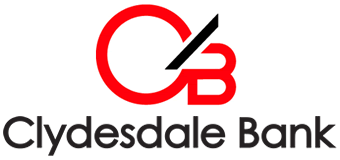
- Offers Business Current Account and Business Choice Account.
- Monthly fee for Business Current Account: £6.50.
- Transaction fees: 30p for cheques and electronic payments.
- Business Choice Account offers tiered interest rates based on surplus funds.
- Suitable for UK-based businesses.
- Proof of business operation in the UK is required.
Co-operative Bank business account

- Ethical Business Current Account with 18 months of free banking for new businesses.
- After the free period, transaction fees apply (30p per cheque, 23p per £100 cash deposit).
- Online banking and contactless Visa debit card included.
- No interest paid on current account balances.
- Eligibility criteria include adherence to the Co-operative Bank’s ethical policy.
Countingup business account

- All-in-one business account and accounting solution.
- Primarily aimed at small businesses and freelancers.
- Includes automated bookkeeping and tax estimates.
- Offers real-time invoicing and instant payment notifications.
- Accessible through a mobile app.
- Allows businesses to track expenses and categorise transactions.
- Tiered pricing structure based on monthly deposits.
- Starter plan is free for deposits under £500 per month.
- Standard plan costs £4.95 per month for deposits between £500 and £1,500.
- Premium plan costs £9.95 per month for deposits over £1,500.
- Free electronic payments, but ATM withdrawals cost £1.
- Charges a 2% fee for cash deposits.
Cumberland Building Society business account

- Business current account designed for local businesses in the North West of England.
- No monthly fee for account maintenance.
- Includes a Visa debit card and access to online banking.
- Offers overdraft facilities, subject to approval.
- Charges 65p for cheques paid in or issued.
- Cash handling fees of 0.65% of the value.
- Interest is not typically paid on current account balances.
- Focus on businesses within the society’s branch network.
- FSCS protection up to £85,000.
- Standard identification and business documentation required for account opening.
Cynergy Bank business account

- Formerly known as Bank of Cyprus UK, with a focus on SMEs.
- Business current account requires a £1,000 minimum deposit to open.
- Monthly maintenance fee of £7.50.
- Transaction fees include 30p per cheque, standing order, or direct debit.
- 40p per electronic payment.
- Offers business savings accounts with competitive rates.
- 95-Day Notice Account offers around 0.60% AER for balances over £10,000.
- UK-based businesses eligible for accounts.
- Proof of identity and business operation required for opening.
- FSCS protection for deposits up to £85,000.
Danske Bank UK business account

- Business current account for small and medium-sized enterprises.
- Monthly fee of £5.50 for account maintenance.
- Offers internet and mobile banking access.
- Debit card included for business transactions.
- Charges 70p per cheque paid in or issued.
- 35p for direct debits and electronic payments.
- Cash handling fees of 0.75% of the amount processed.
- No interest is typically paid on current account balances.
- FSCS protection up to £85,000.
- Standard identity and business verification required for account opening.
Fair Everywhere business account

- Business banking service with a focus on multi-currency accounts.
- Ideal for businesses dealing with international clients.
- Flat monthly fee of £12.50 covers most services.
- Free electronic payments and ATM withdrawals included.
- Offers 1% cashback on business card purchases.
- Supports holding, managing, and exchanging 31 currencies.
- Online platform allows businesses to track financial transactions in real time.
- Integrated with popular accounting software.
- Easy online account opening process with minimal documentation.
- FSCS protection is not available due to its payment institution status.
GoSolo business account

- Digital business account targeted at startups, freelancers, and small business owners.
- No monthly account fees for standard services.
- Allows easy invoicing and expense tracking.
- Offers instant payment notifications.
- Free UK transactions, including bank transfers and card payments.
- Prepaid Mastercard available for business expenses.
- Fees apply for international transactions and currency exchange.
- Designed to simplify business banking with user-friendly digital tools.
- Quick online application process with no credit checks.
- Eligibility includes being a UK resident and having a UK-registered business.
Hampshire Trust Bank business account

- Specialises in business savings accounts with competitive interest rates.
- No standard business current accounts available.
- Business Notice Accounts provide access to funds with a notice period.
- 90-Day Notice Account offers approximately 0.75% AER.
- Minimum deposit of £1,000 required to open an account.
- No monthly maintenance fees for savings accounts.
- Interest rates vary depending on the account type and balance.
- Ideal for UK businesses looking to maximise returns on surplus cash.
- Application requires standard business documentation.
- FSCS protection up to £85,000.
Holvi business account

- Digital banking service for freelancers and entrepreneurs.
- Business current account with integrated financial tools.
- Free Holvi Lite account with basic features like invoicing and a Mastercard.
- Holvi Pro account at €12 per month offers advanced bookkeeping features.
- Transaction fees include €0.25 for SEPA transfers.
- Free card payments with the Mastercard.
- Cash withdrawals charged at €2.50 per transaction.
- Designed for ease of use and financial management.
- Offers features such as expense tracking and tax estimates.
- Available to businesses registered in supported countries, including the UK.
HSBC business bank account

- Offers Business Current Account and Electronic Banking Account for SMEs.
- Monthly account fee of £6.50 for the Business Current Account.
- Transaction fees: 23p per cheque, 35p for electronic payments.
- Cash handling fees of 23p per £100 deposited or withdrawn.
- Electronic Banking Account has lower fees for businesses that mainly transact online.
- Offers business savings accounts with variable interest rates.
- FSCS protection up to £85,000 for eligible deposits.
- Requires standard business documentation for account opening.
- Tailored solutions for startups and large businesses.
- International banking and multi-currency options available.
ICICI Bank UK business account

- Business current account aimed at SMEs, especially those requiring international banking services.
- Monthly fee of £25, waived if the average monthly balance exceeds £25,000.
- Transaction fees include 25p per cheque and 25p for electronic payments.
- Cash handling fees of 0.5%, with a minimum charge of £1.
- Business savings accounts offer competitive interest rates based on deposit amount and term.
- FSCS protection for deposits up to £85,000.
- Ideal for businesses with a need for cross-border transactions.
- Account opening requires standard identity verification and proof of business operations.
- Online and mobile banking platforms are available.
Intergiro business account

- Digital banking service for businesses with a focus on international operations.
- Offers multi-currency capabilities for global businesses.
- Virtual IBANs provided for handling international transactions.
- Corporate cards available for business expenses.
- SEPA transfers cost €0.30 per transaction.
- 1% fee applied to foreign currency transactions.
- No monthly fee for the basic plan.
- Higher-tier plans like Intergiro.6 cost €60 per month.
- Free unlimited transactions and lower foreign exchange fees with premium plans.
- Ideal for businesses with an international footprint.
- Application process is fully online with flexible eligibility criteria.
Kent Reliance business savings account
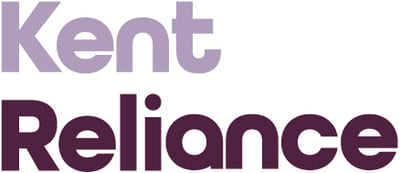
- Focuses on business savings accounts rather than current accounts.
- Business Savings Account requires a minimum deposit of £1,000.
- 60-Day Notice Account offers around 0.55% AER on balances.
- Interest is calculated daily and can be paid monthly or annually.
- No monthly account maintenance fees.
- Designed for UK businesses looking to hold surplus funds.
- FSCS protection up to £85,000.
- No transactional banking services offered.
- Application requires standard business documentation.
- Ideal for businesses prioritising savings over everyday transactions.
Kinetic (HSBC) business account

- Digital business banking platform powered by HSBC.
- Designed for small businesses and startups.
- No monthly fees for the business current account.
- Offers digital bookkeeping, invoicing, and spending analytics.
- Integrated within HSBC's banking system, allowing access to additional services.
- Free transactions within the UK, including electronic payments and ATM withdrawals.
- Fees may apply for international payments and other specific services.
- Mobile app-based banking experience.
- Eligibility focused on UK-based businesses.
- FSCS protection for deposits up to £85,000.
Lloyds Bank business account

- Business current account suitable for SMEs.
- New businesses enjoy 12 months of free banking.
- After the free period, a £7 monthly fee applies.
- Transaction fees after the free period include 70p per cheque and 30p per electronic payment.
- Cash handling fees of 0.75% of the value.
- Offers business savings accounts with variable interest rates.
- FSCS protection up to £85,000.
- Online and mobile banking platforms provided.
- Access to overdraft facilities, subject to approval.
- Eligibility requires UK business operation and standard identification checks.
Masthaven business account

- Specialises in business savings accounts rather than transactional current accounts.
- Fixed Term Business Savings Account requires a minimum deposit of £5,000.
- 1-Year Fixed Term account offers around 0.60% AER.
- No monthly maintenance fees.
- Access to funds restricted until the end of the fixed term.
- Ideal for UK-registered businesses looking to grow surplus funds.
- FSCS protection up to £85,000.
- No transactional banking or day-to-day business account services offered.
- Standard business documentation required for account opening.
- Aimed at businesses looking for fixed-term savings solutions.
Metro Bank business account

- Business current account designed for businesses of all sizes.
- No monthly fee for businesses with low transaction volumes.
- Offers online banking, mobile banking, and in-branch services.
- £5 monthly fee for businesses with higher transaction volumes.
- Transaction fees: 30p per cheque, 30p per electronic payment.
- Cash handling fee of 0.5% of the value.
- Business savings accounts with competitive interest rates.
- Overdraft facilities available, subject to approval.
- FSCS protection up to £85,000.
- Eligibility includes UK business operation and identity verification.
Mettle (powered by NatWest) business account

- Mobile-only business account aimed at freelancers and small businesses.
- No monthly fees for account maintenance.
- Free transactions, including UK electronic payments and ATM withdrawals.
- Offers features such as invoicing, expense management, and cash flow forecasting.
- Entirely managed via a mobile app with a digital-first experience.
- No international payment facilities.
- FSCS protection does not apply as Mettle is not a traditional bank.
- Eligibility includes UK-based sole traders and limited companies.
- Application process is fully online with quick setup.
- Offers integrated bookkeeping tools for small business management.
Monese business account

- Business account designed for small businesses and freelancers.
- Focus on simplicity and quick setup with no lengthy paperwork.
- Multi-currency support for global transactions.
- Monthly fee of £9.95 for the business account.
- Free UK bank transfers and debit card transactions included.
- No fees for ATM withdrawals within the UK.
- International transfers are charged at 2% of the transaction amount.
- Offers expense tracking and integration with accounting software.
- Application process includes minimal eligibility requirements like identity verification.
- Accessible to UK-based businesses and freelancers.
Monzo business account

- Business current account available in two tiers: Lite (free) and Pro (£5 per month).
- Lite account includes basic banking features like free UK transfers and notifications.
- Pro account offers additional tools such as integrated accounting and multi-user access.
- Instant notifications for all transactions.
- Cash deposits available via PayPoints, with a £1 fee per deposit.
- Categorised spending to help track business expenses.
- No monthly fees for the Lite version.
- Pro version ideal for businesses needing more advanced features.
- UK-based sole traders and limited companies are eligible.
- FSCS protection for deposits up to £85,000.
Nationwide business savings account

- Does not offer a dedicated business current account.
- Focuses on personal banking products, including savings and mortgages.
- Business savings accounts available with competitive interest rates.
- Business Savings Account for managing surplus funds.
- Interest rates vary based on the account type and balance amount.
- No monthly fees for maintaining savings accounts.
- FSCS protection up to £85,000.
- Standard business documentation required for account opening.
- Suitable for UK-registered businesses looking for savings solutions.
- No transactional business banking services provided.
NatWest business bank account

- Business current account aimed at small to large businesses.
- 18 months of free banking for new customers.
- After the free period, charges apply based on account usage.
- Transaction fees: 35p per electronic payment, 70p per cheque.
- Cash handling fees of 0.7% of the transaction value.
- Offers a range of business savings accounts with variable interest rates.
- Overdraft facilities available, subject to approval.
- FSCS protection for deposits up to £85,000.
- Access to digital banking tools, including mobile and online banking.
- Eligibility requires UK residency and standard business documentation.
OakNorth business savings account

- Specialises in business savings accounts rather than current accounts.
- Fixed Term Savings Accounts with competitive interest rates.
- Terms range from 6 months to 3 years.
- 12-month Fixed Term account offers around 0.60% AER with a minimum deposit of £1,000.
- No monthly account fees.
- Funds are only accessible after the fixed term ends.
- FSCS protection up to £85,000.
- Designed for businesses with surplus cash looking for fixed returns.
- Application process requires UK registration and standard documentation.
- No transactional banking services available.
PayPal business account

- Business accounts designed for online transactions and e-commerce.
- Features online invoicing and payment processing.
- Integrated with major e-commerce platforms like Shopify and eBay.
- Transaction fees apply, with domestic sales typically charged at 2.9% + a fixed fee.
- International sales incur additional transaction fees.
- Offers card readers for in-person transactions.
- No monthly account fees for basic services.
- Ideal for businesses that rely heavily on online payments.
- Simple online setup process with minimal eligibility requirements.
- FSCS protection does not apply as PayPal is not a bank.
Redwood Bank business savings account

- Focuses on business savings accounts and commercial mortgages.
- No business current accounts available.
- Business savings accounts include Notice Accounts and Fixed Term Deposits.
- Competitive interest rates, with the 95-Day Notice Account offering around 0.65% AER.
- Minimum deposit of £10,000 required for some accounts.
- No monthly account maintenance fees.
- Funds only accessible after the notice period ends.
- FSCS protection up to £85,000.
- Suitable for businesses looking for secure savings options.
- Application process requires UK business registration and documentation.
Revolut Business account

- Digital business banking service with multi-currency support.
- Suitable for businesses that operate internationally.
- Various pricing plans, starting from the free Start plan.
- Free UK bank transfers with paid plans offering more features.
- Corporate cards available for business expenses.
- Expense management tools and integrations with accounting software.
- Transparent low-cost fees for international transactions and currency exchange.
- Enterprise plan available for large businesses with custom pricing.
- Application process is fully online and straightforward.
- FSCS protection does not apply, as Revolut is a financial technology company, not a bank.
Royal Bank of Scotland (RBS) business account

- Business current account designed for SMEs.
- 24 months of free banking for new customers.
- Transaction fees after the free period: 35p per electronic payment, 70p per cheque.
- Cash handling fees of 0.7% of the transaction value.
- Business savings accounts available with variable interest rates.
- Online and mobile banking services offered.
- FSCS protection for deposits up to £85,000.
- Overdraft facilities available, subject to approval.
- Eligibility includes UK-based businesses with standard documentation.
- Offers tailored business support and advice.
Santander business bank account

- Offers a range of business banking products, including the Business Current Account and 1|2|3 Business Current Account.
- Standard Business Current Account has a £7.50 monthly fee.
- 1|2|3 Business Current Account offers cashback and extra benefits for a £12.50 monthly fee.
- Transaction fees: 50p per cheque and 50p per £100 cash deposit.
- Offers business savings accounts with competitive interest rates.
- Overdraft facilities available, subject to approval.
- FSCS protection for deposits up to £85,000.
- Tailored services for startups and SMEs.
- Eligibility requires UK residency and proof of business operations.
- Online and mobile banking services included.
Shawbrook Bank business savings account

- Specialises in business savings and lending products.
- No business current accounts available.
- Offers Easy Access and Fixed Term Business Savings Accounts.
- Interest rates are competitive, with the 120-Day Notice Account offering around 0.55% AER.
- No monthly account maintenance fees.
- Funds only accessible after the notice period.
- Ideal for businesses with surplus cash looking for fixed-term savings.
- FSCS protection for deposits up to £85,000.
- Application process requires UK registration and standard business documentation.
- Lending products are available, subject to approval.
Silverbird business account

- Focuses on providing financial services for international trade businesses.
- Multi-currency business account with support for 30+ currencies.
- Offers cross-border payments with low fees.
- Tailored financial solutions for e-commerce businesses.
- Competitive currency exchange rates with transparent pricing.
- No monthly fees for basic services.
- Suitable for businesses operating globally.
- Offers seamless international payment processing.
- Simple online application process with minimal documentation requirements.
- FSCS protection does not apply as it is a payment institution.
Starling Bank business account

- Digital business account for sole traders, freelancers, and limited companies.
- No monthly fees for the business current account.
- Free UK bank transfers and instant payment notifications.
- In-app transaction categorisation to track expenses.
- Cash deposits through Post Office branches, with a £3 fee per deposit.
- Charges for international transfers: 0.4% of the transaction amount plus a flat fee.
- Business savings account with 0.05% AER on balances.
- No fees for ATM withdrawals within the UK.
- Eligibility includes UK residents with registered businesses.
- FSCS protection for deposits up to £85,000.
State Bank of India (UK) business account

- Offers both a Business Current Account and business savings accounts.
- Business Current Account requires a minimum balance of £5,000 to avoid monthly fees.
- Fixed Deposit accounts available, offering higher interest rates for fixed terms.
- Transaction fees include 25p for electronic payments and £1 for cash deposits per £100.
- Designed for small and medium-sized businesses with international needs.
- Offers online and mobile banking services.
- Business savings accounts with competitive interest rates, based on deposit amounts.
- Supports international banking services, including foreign currency accounts.
- FSCS protection for deposits up to £85,000.
- Standard identity and business documentation required for account opening.
Tide business account

- Digital-only banking service for small businesses and freelancers.
- No monthly fees for the Free plan.
- Offers invoicing and expense management tools.
- Free UK bank transfers included with all plans.
- ATM withdrawal fees of 20p and foreign currency transaction fees of 3%.
- Premium plans (Plus and Premium) available at £9.99 and £49.99 per month, respectively.
- Premium plans include additional features such as legal advice and dedicated customer support.
- Integrated with accounting software for simplified financial management.
- FSCS protection does not apply as Tide is not a traditional bank.
- Eligibility requires UK residency and a UK-registered business.
Triodos Bank business account

- Specialises in sustainable and ethical banking.
- Business current accounts designed for socially responsible organisations.
- Monthly fee of £7.50 for the business current account.
- Transaction fees include 40p for electronic payments and £0.60 per cheque.
- Cash handling fees of 0.5% of the transaction value.
- Business savings accounts available, with interest rates varying depending on the balance.
- Focuses on supporting environmental and socially responsible businesses.
- Online and mobile banking services provided.
- Application process involves assessing the business's alignment with the bank’s ethical criteria.
- FSCS protection for deposits up to £85,000.
TSB business bank account

- Business current account tailored to SMEs.
- Offers 25 months of free banking for new businesses.
- Monthly fee of £5 applies if the balance falls below £10,000 after the free period.
- Transaction fees after the free period: 40p per cheque and 40p per paper transaction.
- Electronic payments are generally free.
- Business savings accounts available with variable interest rates depending on the account.
- Overdraft facilities available, subject to approval.
- FSCS protection for deposits up to £85,000.
- Eligibility includes UK residency and standard business documentation.
- Online and mobile banking platforms available for account management.
Ulster Bank business account

- Business current account aimed at small to medium-sized businesses.
- New customers enjoy up to 24 months of free banking.
- After the free period, monthly account fees and transaction charges apply.
- Transaction fees: 30p per cheque, 30p for direct debits.
- Cash handling fees of 0.65% of the transaction value.
- Offers business savings accounts with variable interest rates.
- Overdraft facilities available, subject to approval.
- FSCS protection for deposits up to £85,000.
- Eligibility requires proof of business operation in the UK and standard documentation.
- Online and mobile banking services provided for easy account management.
United Trust Bank business savings account

- Specialises in business savings accounts and lending products.
- No business current accounts available.
- Business savings accounts include Notice Accounts and Fixed Term Deposits.
- Competitive interest rates, with the 100-Day Notice Account offering around 0.60% AER.
- No monthly account maintenance fees.
- Funds are only accessible after the notice period or fixed term.
- Ideal for businesses with surplus cash looking for fixed returns.
- FSCS protection for deposits up to £85,000.
- Eligibility includes UK registration and standard business documentation.
- Business loans and finance options also available, subject to approval.
Virgin Money business bank account

- Offers a business current account tailored for SMEs.
- Free everyday banking for up to 25 months for new customers.
- Monthly fees apply after the free period.
- Transaction fees: 30p per cheque, 30p for direct debits, and 0.65% for cash handling.
- Business savings accounts available with competitive interest rates.
- Overdraft facilities available, subject to approval.
- FSCS protection for deposits up to £85,000.
- Online and mobile banking services provided for account management.
- Eligibility includes UK residency and proof of business operation.
Wise business account

- Multi-currency business account designed for international transactions.
- Supports holding, managing, and converting 50+ currencies.
- No monthly fees for account maintenance.
- Transparent low-cost fees for currency conversion, typically a small percentage of the transaction.
- Ability to send money to 80+ countries at the real exchange rate.
- Offers business debit cards for managing expenses.
- Ideal for freelancers, sole traders, and businesses with international dealings.
- No FSCS protection as Wise is not a bank but a financial technology company.
- Simple online application process with minimal eligibility requirements.
- International payment fees vary based on the destination and amount.
Yorkshire Bank business bank account

- Business current account designed for businesses of all sizes.
- 25 months of free banking for new customers.
- After the free period, a monthly fee applies, along with transaction fees.
- Transaction fees: 30p per cheque, 30p for electronic payments, and 0.65% for cash handling.
- Business savings accounts available with competitive interest rates.
- Overdraft facilities available, subject to approval.
- FSCS protection for deposits up to £85,000.
- Online and mobile banking platforms available for easy account management.
- Eligibility requires UK business operation and standard documentation.
Zempler Bank business account

- Business current account for SMEs, freelancers, and startups.
- Contactless Mastercard included.
- UK-based customer service.
- Monthly fee of £9.95.
- Free electronic payments and direct debits.
- Cash withdrawals charged at £2 per transaction.
- Overdraft facility up to £2,000 with a representative APR of 24.9%.
Business bank accounts FAQ
Why do I need a business bank account?
A business bank account is essential for keeping your personal and business finances separate, which helps manage your cash flow, track expenses, and prepare tax returns. It also presents a professional image to clients and provides features specifically designed for businesses, like invoicing and multiple user access. For limited companies, it is a legal requirement that your business has its own separate bank account.
What is the best business bank account?
The best business bank account depends on your specific needs. Factors like transaction fees, monthly charges, international banking, and additional services like invoicing or expense management can influence your choice. BusinessBanks.co.uk offers a comparison of leading UK business accounts to help you find the most suitable option.
How do I switch business bank accounts?
Switching business bank accounts is simple thanks to the Current Account Switch Service (CASS). Choose a new bank, and they will handle transferring your direct debits, standing orders, and payments. The switch usually takes seven working days, with your old account closing automatically once the process is complete.
How long does it take to open a business bank account?
Opening a business bank account can take from a few minutes to a few days, depending on the provider. Many digital banks offer quick online applications, while traditional banks may take longer due to additional checks. Having all your documents ready will speed up the process.
How much do business bank accounts cost per month?
The cost of a business bank account varies. Some banks offer free banking for a limited period, while others charge from £5 to £25 or more per month, depending on the account type and features. Additional fees may apply for transactions, cash deposits, and other services.
What documents do you need to open a business bank account?
To open a business bank account, you’ll generally need proof of identity, proof of address, and details of your business. For limited companies, additional documents like a certificate of incorporation and proof of company registration may be required. Sole traders may need tax or self-employment documents.
How do I open a business bank account?
To open a business bank account, choose a provider, apply online or in-branch, and submit the required documents. The process typically involves identity and business verification. Once approved, you can start using your account to manage business transactions and benefit from specialised services.
Types of business bank account compared
Startup business accounts are designed for new businesses with limited financial history. They typically offer a free banking period, allowing businesses to establish themselves without incurring monthly fees. These accounts often include essential features such as invoicing, payment tracking, and support for managing day-to-day transactions.
SME business accounts cater to small and medium-sized enterprises that require more robust banking solutions. They typically offer advanced features like multi-user access, higher transaction limits, and options for managing international payments. These accounts often come with monthly fees but provide a range of services to support growing businesses.
Freelancer and sole trader accounts are tailored for individuals running their own business without the complexity of larger company structures. They offer simplified banking solutions with low fees, automated invoicing, and expense tracking. Many digital-only providers focus on this market, offering easy setup and mobile-first features.
International business accounts are designed for businesses dealing with multiple currencies and cross-border transactions. These accounts often include multi-currency support, competitive foreign exchange rates, and international payment services. They are ideal for businesses operating globally or with suppliers and customers in different countries.
Community and charity accounts are tailored for non-profit organisations, charities, and social enterprises. These accounts often come with reduced or no fees and are structured to meet the specific needs of organisations with limited budgets. They may offer features like dual authorisation for payments and ethical banking options.
Business savings accounts are designed to help businesses grow surplus funds with competitive interest rates. These accounts typically offer notice periods or fixed terms, meaning funds may not be accessible immediately. They are ideal for businesses looking to maximise returns on reserves while maintaining flexibility for future withdrawals.
High street bank business accounts offer traditional banking services with physical branches and in-person support. They typically provide a full suite of services, including overdrafts, loans, and cash handling. However, these accounts often come with higher monthly fees compared to digital-only challengers, but they may offer greater flexibility.
Challenger banks are digital-only providers offering fast, flexible banking solutions for businesses. They often have no physical branches and rely on mobile or online platforms. These accounts typically come with lower fees, quicker setup, and user-friendly features like automated invoicing, expense tracking, and multi-currency support.
Copyright © 2025 BusinessBanks.co.uk • All rights reserved • Contact [email protected]
